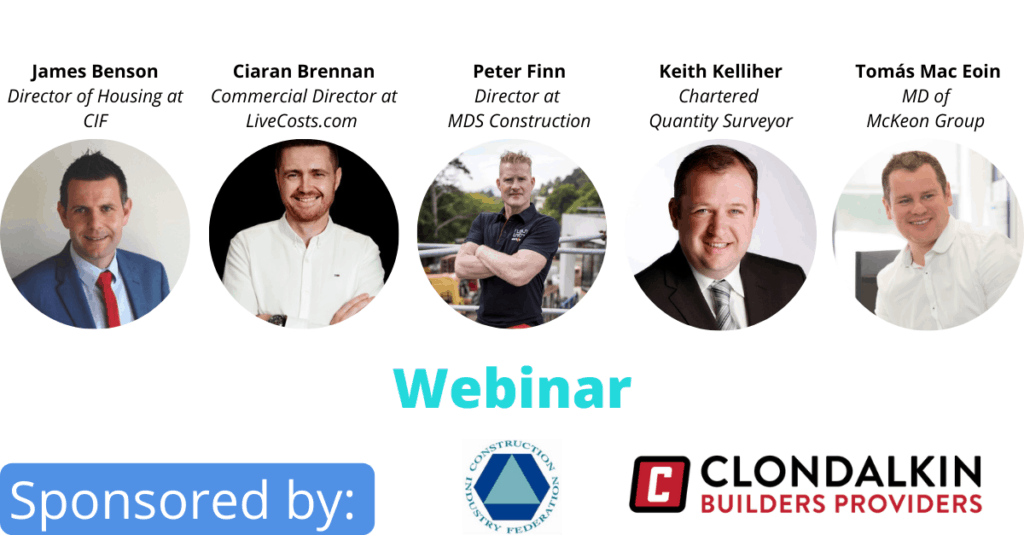Panellists: Ciaran Brennan, James Benson, Tomas MacEoin, Peter Finn, Keith Kelliher
What Will 2021 Bring For Irish Home Builders, Developers And Construction Companies?
2020 threw up some great challenges. These challenges were met face on by our panel who knew only one way out, adapt and keep moving forward.
Webinar Overview
Hear from McKeon Group MD, Tomas MacEoin, on how they have set up an innovation culture leading to a combination of his technology & M&E teams.
Peter Finn on balancing filming Home Rescue for RTE while focusing on growing his business MDS Construction.
James Benson from the CIF on their strategy in creating and publishing the new SOP.
Contracts expert Keith Kelliher on how companies can best prepare themselves should they arrive at a contracts dispute in 2021.
All sharing their insights & strategies to best prepare you for 2021.
Interested in learning more about LiveCosts? Book a call with webinar moderator and LiveCosts Commercial Director, Ciaran Brennan.
Podcast Highlights
Why should I create a culture of innovation in my construction company?
Ciaran:
Tomas, I’m going to start with yourself. You created an innovation culture prior to COVID, and already had systems in place the shift to a work-from-home model. What was the idea behind creating and pushing for a culture of innovation? And what does that even look like, and what’s been the results of that?
Tomas Mac Eoin:
Yeah, right. Thanks, Ciaran. I suppose McKeon Group has always been somewhat innovative. Even, I suppose, we’re third generation now, even going back to me grandfather in the 1950s, he changed and pivoted many times, when times got tough he was actually a general contractor, he used to build schools and houses, et cetera.
Whereas, at one stage, he was making his own blocks. And at other stages, he was, when work was tough on the ground, he moved to turning brush handles for what was the HSE at the time, to making ladders for, I think it was one of the education boards.
So we always had that culture of innovation. But as we grew, we kind of struggled to say, “Well, how do we actually really embed this in as we grow, and as we’ve more managers and more people?” We actually got involved with Enterprise Ireland and we started a couple of courses.
We did, I think it was the Go Global 4 Growth, and then we did Innovation 4 Growth. And we met a guy actually, called Fergal Brofield, off one of them, and I kept in close contact with him. And we actually sought to actually set up a kind of an innovation committee. We actually call it Innovation Boost, so it doesn’t sound like a committee.
But we created this group in McKeon Group, to actually enable people, to give people the head space to actually work on new things, to go out and empathize with the different site managers, with the different trades people, with our whole teams, to actually see… They’re the people who actually see the problem in our processes and how we can actually improve.
So we had that set up just prior to COVID. Really, the end of last year. And this time last year, we started getting that and those conversations flowing. So when COVID hit off, we would be able to mobilize and actually see what solutions could we bring to the forum? And I suppose, the big one for us was a safe return to site.
And we actually developed our own app in house that we called Good2Go, which has grown legs actually since it’s more features, but it’s all around… I suppose, the apps are commonplace now. We see them now with the GAA, but at the time there was nothing on the market. It was actually, “How do we make sure that people coming to the site are COVID free?” And, “How do we record it?” And, “How do we actually maintain a database of who has been in contact with whom, and on what sites?”
Ciaran:
And that was something that you developed yourself, in-house?
Tomas Mac Eoin:
Yeah. So again, the committee kind of came up with it and then we were able to quickly… We actually used, we’re an Office 365 house, so we use Microsoft Power Apps. And I suppose, we have our technology division as well, so we were able to leverage the skills there to actually quickly develop the app in-house, and that’s what we did. I think we had rolled out from concept to this first version in something like two days.
How did the CIF successfully implement and release the new Standard Operating Procedures document to combat COVID-19?
Peter:
Our industry was in a strong position, in that over the last decade in particular, the health and safety has increased and has become so well streamlined, even on small sites, that the transition into COVID protocols was actually relatively easy.
Obviously, once we got a bit of preparation done and in fairness to the CIF there. The CIF were very good and they gave us clear guidelines fairly quickly. And I know that other industries didn’t get that support. So it didn’t make it easy, but it certainly helped a lot, you know? And so that was certainly a big help to us.
And then we basically worked with RTE to make sure that all the protocols were worked together with themselves. So it led to a very interesting year and it certainly made things a little bit more difficult on site when we were filming the show, but thankfully we were able to continue on site, on our normal day to day fairly quickly once the government restrictions allowed us to do so, you know?
Ciaran:
You certainly weren’t the first person I’ve heard to compliment the CIF in terms of their reaction and how quick they put together the standard operating procedures document. James were you involved in that particular play? I mean how quick and what effort was involved in putting together such a document at such a pace and getting it out to those that needed it?
James:
Oh, look, I think it was all shoulders to the wheel for everyone. It was like CIF internally and the members themselves and all of those within the industry. I think like really the industry is a community really, not to sound too aspirational or soppy on it, but Peter, good work that he does throughout the years, relies on community spirit.
I think everyone within the industry sort of knows themselves, we’ve all crossed paths. I’ve been on site for for Tomas doing work directly before, back in the day before my current vein, but everyone knows each other. And I think that sort of community spirit led very quickly to being able to put together a standard operating procedure.
What led to it? I suppose there was a committee. We have our, obviously the health and safety committee within CIF. We probably had 60 volunteers at the time to get down and dirty very quickly to produce that standard operating procedure that was adopted. There was a lot of work that did get involved, but we would’ve been futile without those on the ground implementing it and implementing it the way they did up and down the country without question. It was adopted, we saw very, very, if any cases where people weren’t in compliance.
Now, I suppose, when you take stock of what’s happening in the last year, when we look back only six, seven months ago, we were in a position where we couldn’t operate, we weren’t designated as essential unless you were dealing with construction work specifically related to health services. In the last lockdown in level five restrictions we were classified as essential. And to get that categorization right up to level five I think is a testament to the low number of cases that we’ve seen within the sector within the industry.
And that’s a result of what people were doing on the ground. Actually as a case, it was probably safer to be actually operating on site because of the procedures that were in place than actually, your day to day living after work. So it was really down to the testament of what everyone was doing, and the members were doing on the ground. So you can produce anything, but unless there’s take up for it, and as Peter said, thankfully, the industry had made great advances in the last 10 years on health and safety. Without that, there were many other sectors that were going from a stand and start to try and catch up on this. So between our own technology and health and safety, thankfully we were in the position to be able to operate.
Ciaran:
Yeah, it definitely feels like we had a headstart there in terms of health and safety and putting together quick protocols, but when you’re generally a safe industry anyway, it feels like we tend to have that bit of a head start.
How did companies react to their construction contract concerns due to COVID19?
Ciaran:
One of the areas where there was big questions, and Keith I’ll fire this across to yourself. When lockdown came, we experienced instant delays, questions around contracts. We spoke at the time around the words force majeure, you have to give me a bit of an education about what all that might mean at the time, but taken back to lock down and coming out of lock down was there many companies contacting you with concerns around the contracts and that as we reopened into May?
Keith:
Yeah look it was like Armageddon for the first few weeks. We could have nearly just had people operating a phone service really at the start, but I think once it settled down, I think it was the initial thing was force majeure. It’s an unknown entity. It found its way into contracts. It’s traditionally came from a French kind of idea and that term has found its way into our RAI standard form of contract, but there’s no definition. There’s no court cases in Ireland in respect to what it means, what way the courts would view it and really nobody really knew. Even some of the finest construction law minds in Ireland were writing blogs and going on this and that, and not really being able to kind of steer people exactly as to what this will actually mean and that uncertainty was the biggest issue for people.
I suppose the fragrance of different types of contracts that we have in Ireland, between subcontractors and a range of different main contracts we have was also a concern in terms of how do individual contractors deal with it and whether clients were going to cooperate with builders or whether they were going to use it as an opportunity to bring down costs. So that uncertainty, all of that uncertainty was a big worry for a lot of people at the start. I suppose we look back now, we look back at a scenario where to be fair, the construction industry have just put their shoulder to the wheel. They’ve suffered the cost because outside of the government and the ex-gratia payment, outside of some private individuals may be doing one-off deals or whatever with the industry. The industry have had to carry that cost and continue to carry that cost and will continue to carry that cost into the future and it is a big issue.
It’s an issue that won’t go away because our contract simply didn’t allow contractors to cover the cost of implementing the CIF protocol. As an example, all of the bits that go with that and the contract simply didn’t allow contractors a way to get that money back and hence the ex gratia payment came into discussion because the government knew themselves that their contracts didn’t allow for this.
So they had to in some way come back to the industry and give them money, but private clients in the main, haven’t done that. A lot of them wouldn’t be in a position to do that and the delays to the projects will have obviously had an impact on clients as well in terms of finance and everything else. So the things I suppose, most people got the time, time never became an issue. I haven’t heard of anybody who has had to fight for the time that COVID closed them down, but not a lot of people have got finance for that time or for the cost of the implementing the protocols and things like that. So it is an issue and it will be one going on into the future.
The Irish construction industry shares their feelings on how 2021 plays out
Ciaran:
In a couple of words, what’s 2021? What will be the result of 2021? Let’s say we’re fast forward this 12 months. How do you feel this is going to play out? So in a couple of words, let’s just throw it around, Tomas?
Tomas:
I was going to say holidays. No, I think that this digital transformation for the construction industry will really be really, really accelerated.
Ciaran:
Yeah. Keith?
Keith:
Hopefully people will just be more prepared, just commercially, be more prepared, be more educated and an educated workforce will mean that I’m not busy and I’m happy to do that. So be prepared and be educated.
Ciaran:
Yep, Peter?
Peter:
Yeah, I will just agree with what the two lads said there and I think we’re going to be more streamlined. I think every person now knows how to use technology a little bit better because of this. The likes of your own, LiveCosts, I think are going to start becoming very important for people as well, to streamline every single thing you’ve got and to do in your business. So I think I resonate with the boys there, be prepared and be ready for some challenges, but at least we’re here talking about a busy year ahead. We could be very easily sitting here, which we have in previous years where there was nothing ahead of us. So I’ve got energy and I’m willing to use it. And I’m going to try and do it in a smart way.
Ciaran:
Yeah. Last word on to you, James.
James:
I think we’ll see more of the same from the sector and the industry, like we’ll continue to adapt and move forward and just hope that the wider stakeholders and everyone involved in this start to recognize ourselves as part of the solution and not the problem. So I think we’ll just see that continued adoption that we’ve always seen from the sector.
Ciaran:
Brilliant. Lads, I appreciate your time. Really, as I said at the outset of this, the goal is, just each one of you individually torched on, the truth is there is definitely a community type of thing starting to happen, I think COVID’s accelerated that as well, sharing information and all we’re trying to do there is provide a platform to bring people together.


